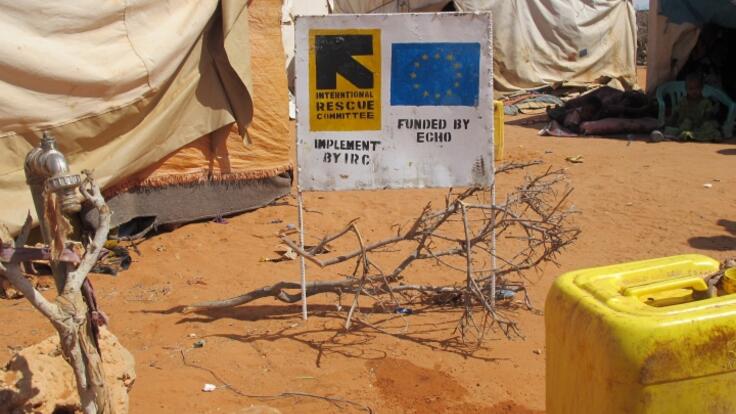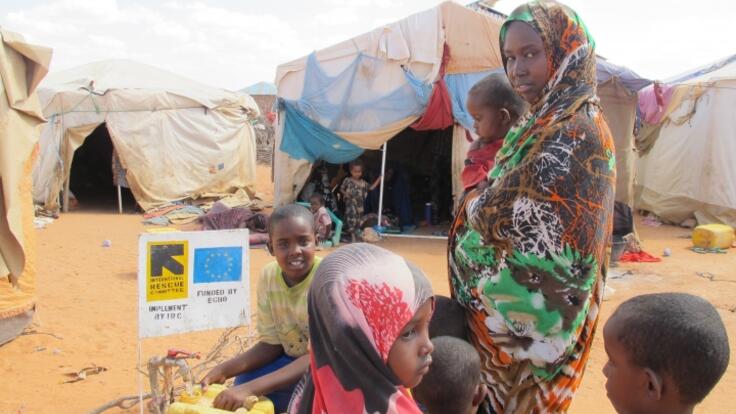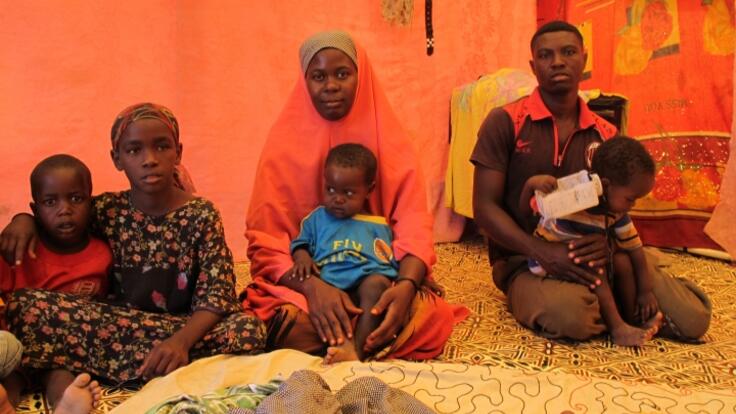“Water is life. If you don’t have water, you don’t have life,” says Fozia Ahmed Karshe.
Fozia and Hawa Ali Ibrahim are both in their twenties and passionate about providing clean and safe water to their communities. I met them recently in Somalia. Born in Mogadishu, they fled the war for the relative safety of camps for displaced people in Galkacyo, central Somalia.
As members of the IDP (Internally Displaced Persons) Water Users’ Association, they are responsible for ensuring that people in the camps have access to clean water. Waterborne diseases such as diarrhoea and cholera are amongst the biggest killers of children in Africa. In 2012 the IRC gave 1.4 million people access to clean drinking water and sanitation.
“Before I was asked to join the water committee, I was always solving people’s problems. So much so that they nicknamed me Miss Solution,” laughs Fozia, 28. She lives in Calanley camp in Galkayo with her husband Hassan Mohahmmed Ali (48) and their seven children and is still solving problems ranging from marital disputes to providing advice on best hygiene practices.
Fozia describes living in the camp as extremely difficult, “Life here is not so good. Everything is expensive, rice, milk and even water is expensive. It’s not that easy. I have no work. There is not any work and I also have a liver disease which means I am unable to do any heavy work such as washing clothes or rubbish collection,” she explains. For four months last year the family were given food vouchers by the IRC. These vouchers were given to the most needy familes, “We were able to buy rice, milk, oil, tea and sugar. It has been good because the children are very young and need everything,’ she says.
As a member of the water committee it is Fozia’s job to make sure that the community is aware of how to keep their water clean, she is also responsible for managing the water points within the camp. “I use water to drink, clean and cook food. If you don’t have water you can’t cook anything. You are thirsty, you cannot do anything,” she continues.
As a teenager Fozia’s dream was to work as an aid worker, “but the war in Mogadishu destroyed my mind,” sadly, her mother was killed in Mogadishu, Somalia’s capital during heavy fighting. Fozia was also injured. “We were told by a friend that this place was safe so we came here,” explains Hassan. He is very proud of the work that his wife is doing in the water committee, “She is doing a good job. I am proud of her,” he says, smiling.
The IRC, with support from the European Commission’s Department for Humanitarian Aid and Civil Protection (ECHO), the Office of US Foreign Disaster Assistance and other private donors, provides clean water, sanitation and hygiene services throughout Mudug region, of which Galkacyo is a part, for people uprooted by drought and conflict and living in camps, as well as host communities. We work in six camps for internally displaced people, as well as with local communities. “Before we started working with the communities in the camps, there were many problems,” says Ibrahim Ali, who works on the IRC’s water, sanitation and hygiene projects in Galkacyo. , “Children weren’t able to go to school because they had to fetch water from long distances. Women were attacked while fetching water. But we have extended water lines into the camps so the distance isn’t far. We have also repaired boreholes,” he explains. In the last year alone, the IRC rehabilitated 6 boreholes and 34 shallow wells, as well as excavating 3 water pans, and our water, hygiene and sanitation projects benefitted approximately 65,000 people.
Before the water committee was established in Carafat camp, home to Hawa (29) and her family, she took it upon herself to manage the water point. “Because it was near my house. I used to handle disputes too,” she recalls. Hawa was a natural choice to be a member and represent her community, “My responsibility is to handle problems related to the water. I also visit people door to door where I look at their water containers and the general condition of their homes and talk to them about the importance of hygiene. I really like doing this work because I am sharing the knowledge that I was given to my neighbours.”. She can see the positive impact on her own family too, “I practice safe hygiene myself in my own home so I am saving the lives of my children,” she says. Hawa received training from the IRC in how to maintain and operate a water point, water chlorination and general water safety, and how to identify the most vulnerable members of the community and ensure that their water needs are taken into account. For every water source the IRC rehabilitates or constructs, twelve to fifteen water committee members receive the same training as Hawa. At least thirty per cent of all water committee members must be women; meeting household water needs is predominantly the role of women and girls in Somali. By making sure women are included in the committees the IRC aims to prioritise household water access – water is also used for livestock - as well as to ensure inclusivity in the management of public resources.
Hawa came to Carafat camp five years ago from Mogadishu. Her first husband and the father of her first three children was killed, “One day armed men came to our house. They said they want the man of the house. I was in the kitchen. They told him to come out and that they wanted to show him what they do to men who work for the government. But he told them to come and kill him where he was sitting,” she recalls. By the time Hawa came out of the kitchen she saw the men go into the house. “They shot him and left. He died after two hours at the hospital,” she says. Not long afterwards, she decided to come to Galkacyo. “I couldn’t stay there because of all the fighting and I had just lost my husband and there was no humanitarian support,” she says.
Hawa would like to go back to Mogadishu one day, “I will go back if it will be completely peaceful, like the way it was before, but right now it isn’t,” she says. In Mogadishu Fozia used to sell combs, mirrors and henna on a small cart. “It was a good business, I used to earn 150,000 Somali shillings ($7) a day and I had regular customers. But now I don’t have the capital to start such a business here. I enjoyed doing it and gained good experience.” Today Fozia earns a living by washing clothes, “we depend on what we can get from the host community. Sometimes I get work and other times I don’t.” Since arriving in Carafat, Hawa has remarried. Her husband Mohammed is an old friend from Mogadishu. Like Fozia’s husband, Mohammed is very proud of Hawa, “I am very happy that my wife was chosen for such a position which is benefiting the whole community. I am so proud and happy about that,” he says.


